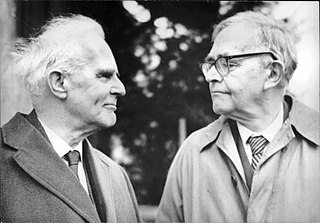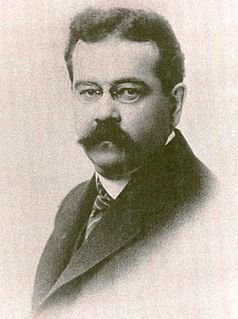A Quote by Thomas Keating
The chief thing that separates us from God is the thought that we are separated from God.
Related Quotes
What it does remind us is that 'God' is not to be separated from the quest for the Kingdom of God and is not and cannot be the object of any detached 'scientific' contemplation. Heidegger's critique of onto-theology is also driving a wedge between speaking of God and the aims of science - not so as to get rid of God but rather to free God from a false objectification.
There are two gods. The god our teachers teach us about, and the God who teaches us. The god about whom people usually talk, and the God who talks to us. The god we learn to fear, and the God who speaks to us of mercy. The god who is somewhere up on high, and the God who is here in our daily lives. The god who demands punishment, and the God who forgives us our trespasses. The god who threatens us with the torments of Hell, and the God who shows us the true path.
There are two gods. A god who casts us off because of our sins, and a God who calls to us with His love.
Do we not see God at work in our circumstances? Dark times are allowed and come to us through the sovreignty of God. Are we prepared to let God do what He wants with us? Are we prepared to be separated from the outward, evident blessings of God? Until Jesus Christ is truly our Lord, we each have goals of our own which we serve. Our faith is real, but it is not yet permanent. And God is never in a hurry. If we are willing to wait, we will see God pointing out that we have been interested only in his blessings, instead of God Himself.
Only at the cross of Christ does man see fully what it is that separates him from God; yet it is here alone that he perceives that he is no longer separated from God. Nowehere else does the inviolable holiness of God, the impossibility of overlooking the guilt of man stand out more plainly; but nowhere else does the limitless mercy of God, which utterly transcends all human standards, stand out more clearly and plainly.
It is a wonderful thing to see a first-rate philosopher at prayer. Tough-minded thinking and tenderhearted reverence are friends, not enemies. We have for too long separated the head from the heart, and we are the lesser for it. We love God with the mind and we love God with the heart. In reality, we are descending with the mind into the heart and there standing before God in ceaseless wonder and endless praise. As the mind and the heart work in concert, a kind of loving rationality pervades all we say and do. This brings unity to us and glory to God.
Does God have a reason for wanting us to be charitable, to take care of those who can't take care of themselves? Either God does or God doesn't, it's just logic. If God has a reason then there is a reason independent of God and whatever God's reason is we should figure it out for ourselves. There is a reason and God doesn't really ground morality at all. God wants us to give charity because it's the right thing to do.
Time spent in prayer will yield more than that given to work. Prayer alone gives work its worth and its success. Prayer opens the way for God Himself to do His work in us and through us. Let our chief work as God's messengers be intercession; in it we secure the presence and power of God to go with us.
If someone were to ask me whether I believed in God, or saw God, or had a particular relationship with God, I would reply that I don't separate God from my world in my thinking. I feel that God is everywhere. That's why I never feel separated from God or feel I must seek God, any more than a fish in the ocean feels it must seek water. In a sense, God is the "ocean" in which we live.
That experience showed me that I-from moment to moment-am the only person in control of my connection to God. It's not that God is deciding to connect with me, depending on whether I had a good day, or did good or bad deeds. It's all up to me. God, the awareness of God, the love of God, the blessings of God-that lively ecstasy-is always there. It's me who separates from God by judging, by indulging in negativity, by criticizing myself, as well as others.
The whole story of creation, incarnation, and our incorporation into the fellowship of Christ's body tells us that God desires us, as if we were God, as if we were that unconditional response to God's giving that God's self makes in the life of the Trinity. We are created so that we may be caught up in this, so that we may grow into the wholehearted love of God by learning that God loves us as God loves God.
We spoke to God about the children, and we were afraid to ask God for specific things. We thought that it might be too much. So we said to God 'Please give us a healthy child' and left it at that, not knowing that God is a generous God, but also has a sense of humor. And if you leave that much open for God, some wonderful jokes are going to come about.
With the Fall all became abnormal. It is not just that the individual is separated from God by his true moral guilt, but each of us is not what God made us to be. Beyond each of us as individuals, human relationships are not what God meant them to be. And beyond that, nature is abnormal - the whole cause-and-effect significant history is now abnormal. To say it another way: there is much in history now which should not be.






































